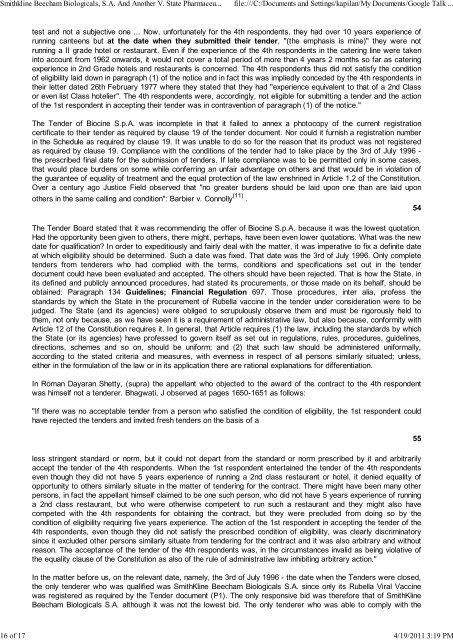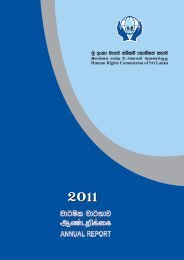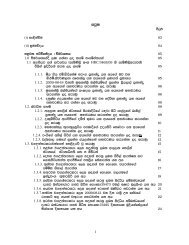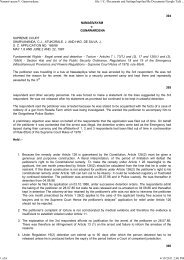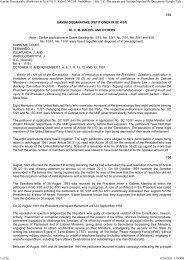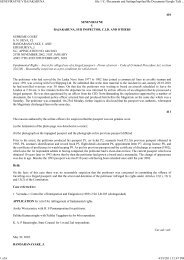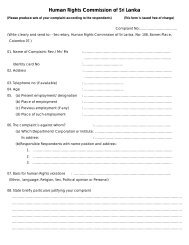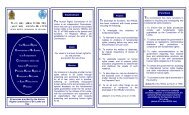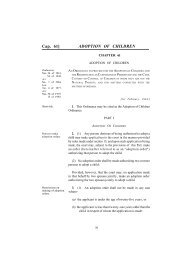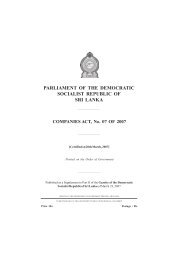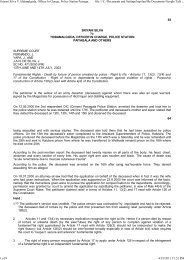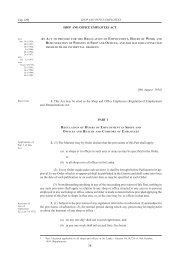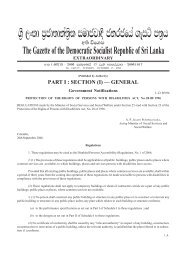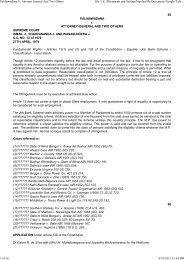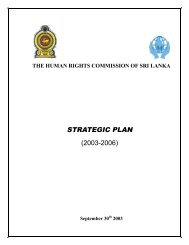Smithkline Beecham Biologic... - Human Rights Commission of Sri ...
Smithkline Beecham Biologic... - Human Rights Commission of Sri ...
Smithkline Beecham Biologic... - Human Rights Commission of Sri ...
Create successful ePaper yourself
Turn your PDF publications into a flip-book with our unique Google optimized e-Paper software.
<strong>Smithkline</strong> <strong>Beecham</strong> <strong>Biologic</strong>als, S.A. And Another V. State Pharmaceu... file:///C:/Documents and Settings/kapilan/My Documents/Google Talk ...<br />
test and not a subjective one ... Now, unfortunately for the 4th respondents, they had over 10 years experience <strong>of</strong><br />
running canteens but at the date when they submitted their tender, "(the emphasis is mine)" they were not<br />
running a II grade hotel or restaurant. Even if the experience <strong>of</strong> the 4th respondents in the catering line were taken<br />
into account from 1962 onwards, it would not cover a total period <strong>of</strong> more than 4 years 2 months so far as catering<br />
experience in 2nd Grade hotels and restaurants is concerned. The 4th respondents thus did not satisfy the condition<br />
<strong>of</strong> eligibility laid down in paragraph (1) <strong>of</strong> the notice and in fact this was impliedly conceded by the 4th respondents in<br />
their letter dated 26th February 1977 where they stated that they had "experience equivalent to that <strong>of</strong> a 2nd Class<br />
or even list Class hotelier". The 4th respondents were, accordingly, not eligible for submitting a tender and the action<br />
<strong>of</strong> the 1st respondent in accepting their tender was in contravention <strong>of</strong> paragraph (1) <strong>of</strong> the notice."<br />
The Tender <strong>of</strong> Biocine S.p.A. was incomplete in that it failed to annex a photocopy <strong>of</strong> the current registration<br />
certificate to their tender as required by clause 19 <strong>of</strong> the tender document. Nor could it furnish a registration number<br />
in the Schedule as required by clause 19. It was unable to do so for the reason that its product was not registered<br />
as required by clause 19. Compliance with the conditions <strong>of</strong> the tender had to take place by the 3rd <strong>of</strong> July 1996 -<br />
the prescribed final date for the submission <strong>of</strong> tenders. If late compliance was to be permitted only in some cases,<br />
that would place burdens on some while conferring an unfair advantage on others and that would be in violation <strong>of</strong><br />
the guarantee <strong>of</strong> equality <strong>of</strong> treatment and the equal protection <strong>of</strong> the law enshrined in Article 1.2 <strong>of</strong> the Constitution.<br />
Over a century ago Justice Field observed that "no greater burdens should be laid upon one than are laid upon<br />
others in the same calling and condition": Barbier v. Connolly (11) .<br />
The Tender Board stated that it was recommending the <strong>of</strong>fer <strong>of</strong> Biocine S.p.A. because it was the lowest quotation.<br />
Had the opportunity been given to others, there might, perhaps, have been even lower quotations. What was the new<br />
date for qualification? In order to expeditiously and fairly deal with the matter, it was imperative to fix a definite date<br />
at which eligibility should be determined. Such a date was fixed. That date was the 3rd <strong>of</strong> July 1996. Only complete<br />
tenders from tenderers who had complied with the terms, conditions and specifications set out in the tender<br />
document could have been evaluated and accepted. The others should have been rejected. That is how the State, in<br />
its defined and publicly announced procedures, had stated its procurements, or those made on its behalf, should be<br />
obtained: Paragraph 134 Guidelines; Financial Regulation 697. Those procedures, inter alia, pr<strong>of</strong>ess the<br />
standards by which the State in the procurement <strong>of</strong> Rubella vaccine in the tender under consideration were to be<br />
judged. The State (and its agencies) were obliged to scrupulously observe them and must be rigorously held to<br />
them, not only because, as we have seen it is a requirement <strong>of</strong> administrative law, but also because, conformity with<br />
Article 12 <strong>of</strong> the Constitution requires it. In general, that Article requires (1) the law, including the standards by which<br />
the State (or its agencies) have pr<strong>of</strong>essed to govern itself as set out in regulations, rules, procedures, guidelines,<br />
directions, schemes and so on, should be uniform; and (2) that such law should be administered uniformally,<br />
according to the stated criteria and measures, with evenness in respect <strong>of</strong> all persons similarly situated; unless,<br />
either in the formulation <strong>of</strong> the law or in its application there are rational explanations for differentiation.<br />
In Roman Dayaran Shetty, (supra) the appellant who objected to the award <strong>of</strong> the contract to the 4th respondent<br />
was himself not a tenderer. Bhagwati, J observed at pages 1650-1651 as follows:<br />
"If there was no acceptable tender from a person who satisfied the condition <strong>of</strong> eligibility, the 1st respondent could<br />
have rejected the tenders and invited fresh tenders on the basis <strong>of</strong> a<br />
less stringent standard or norm, but it could not depart from the standard or norm prescribed by it and arbitrarily<br />
accept the tender <strong>of</strong> the 4th respondents. When the 1st respondent entertained the tender <strong>of</strong> the 4th respondents<br />
even though they did not have 5 years experience <strong>of</strong> running a 2nd class restaurant or hotel, it denied equality <strong>of</strong><br />
opportunity to others similarly situate in the matter <strong>of</strong> tendering for the contract. There might have been many other<br />
persons, in fact the appellant himself claimed to be one such person, who did not have 5 years experience <strong>of</strong> running<br />
a 2nd class restaurant, but who were otherwise competent to run such a restaurant and they might also have<br />
competed with the 4th respondents for obtaining the contract, but they were precluded from doing so by the<br />
condition <strong>of</strong> eligibility requiring five years experience. The action <strong>of</strong> the 1st respondent in accepting the tender <strong>of</strong> the<br />
4th respondents, even though they did not satisfy the prescribed condition <strong>of</strong> eligibility, was clearly discriminatory<br />
since it excluded other persons similarly situate from tendering for the contract and it was also arbitrary and without<br />
reason. The acceptance <strong>of</strong> the tender <strong>of</strong> the 4th respondents was, in the circumstances invalid as being violative <strong>of</strong><br />
the equality clause <strong>of</strong> the Constitution as also <strong>of</strong> the rule <strong>of</strong> administrative law inhibiting arbitrary action."<br />
In the matter before us, on the relevant date, namely, the 3rd <strong>of</strong> July 1996 - the date when the Tenders were closed,<br />
the only tenderer who was qualified was SmithKline <strong>Beecham</strong> <strong>Biologic</strong>als S.A. since only its Rubella Viral Vaccine<br />
was registered as required by the Tender document (P1). The only responsive bid was therefore that <strong>of</strong> SmithKline<br />
<strong>Beecham</strong> <strong>Biologic</strong>als S.A. although it was not the lowest bid. The only tenderer who was able to comply with the<br />
16 <strong>of</strong> 17 4/19/2011 3:19 PM<br />
54<br />
55


